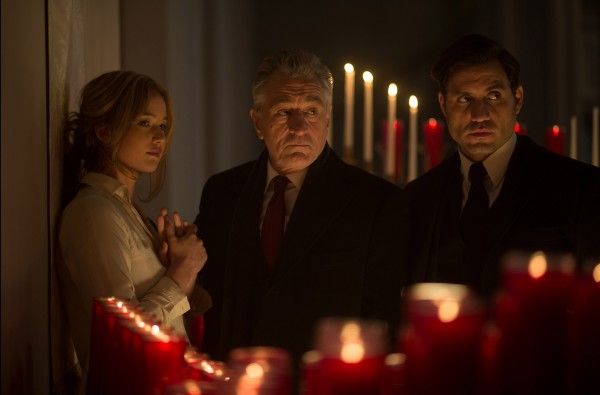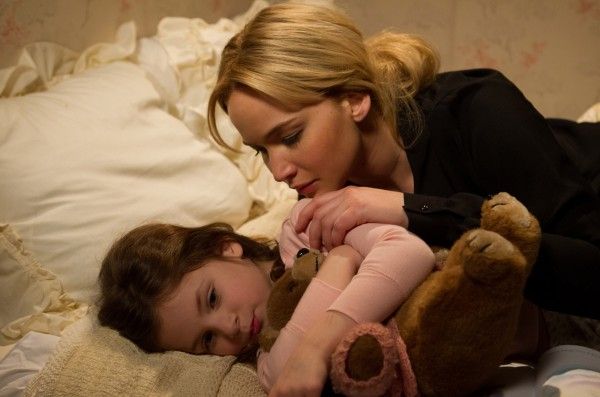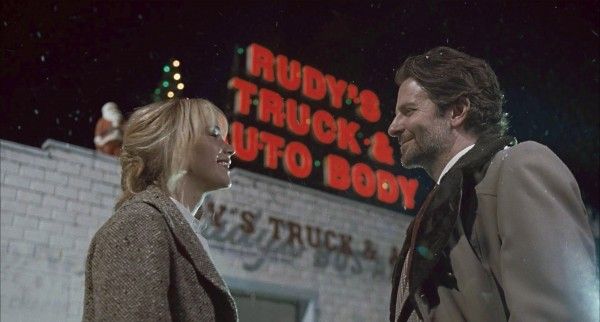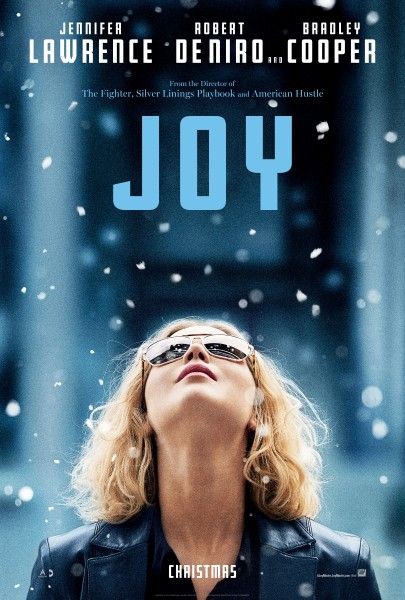From the opening moments of David O. Russell’s new film Joy, it’s unclear if even the director knows exactly what he wants to spin out of his movie. It leads by telling us that it was “inspired by stories of daring women…one in particular,” then it moves to showing us the soap opera Joy’s mother Carrie (Virginia Madsen) will watch throughout the movie, and then we get our narrator, Joy’s grandmother Mimi (Diane Ladd), telling us how her granddaughter will be a huge success. It’s a grand windup for a pitch that has all of the impact of the bumper sticker “Well-behaved women rarely make history.”
Loosely based on the life of Joy Mangano, inventor of the Miracle Mop and a regular presence on the Home Shopping Network, Joy follows its eponymous character, played by Jennifer Lawrence, as she attempts to get her self-wringing mop through the gauntlet of unfair business practices and callow family members that seem willing—if not eager—to tear her down at every turn. But before we even get to the mop, the first act of Joy plays almost like Russell’s earlier movies about bizarre family relationships. While the opening half hour of the movie may not spark like those films, it’s at least a welcome reprieve from the safety the director has retreated to with crowdpleasers like Silver Linings Playbook and American Hustle, works that aren’t necessarily bad, but they completely lack the bite of Three Kings, Flirting with Disaster, and I Heart Huckabees.
Then the movie settles in on Joy pursuing her dream, and it doesn’t seem to know what to do with the story other than lay the blame for Joy’s failings at the feet of everyone else, and have all of her success come from when she gathers the confidence to storm in and own the room. That’s what you get when you hire Jennifer Lawrence these days: she can fall apart crying one moment, but she can also be a total badass the next. She sells both sides well, and yet it lacks some of the impact of her previous performances, especially as she slides into a New York accent only when she wants to sell Joy’s toughness.
Because the film treats Joy as infallible and it’s the world that’s messed up, there’s not much of a character arc for her. It’s more about realizing her destiny and inner strength, but Russell can’t find a convincing origin for it. Her grandmother may be an inspiration, but she hovers around like a specter that, for all intents and purposes, only Joy can hear and see. Carrie is a shut-in with severe anxiety issues; her father Rudy (Robert De Niro) has to move in with his daughter when his ex throws him out despite having his own business; and Mimi may be present, but she’s not an active character. She doesn’t have advice for Joy. Joy is innately wise and as a child says things like “I don’t need a prince,” which is a great sentiment, but Russell doesn’t build around it.
Instead, Russell slathers on style and pop songs to give the impress of an electric atmosphere and prays his actors can carry the day for his undercooked narrative that should be so much richer than it is. Joy, rather than a celebration of women, or one woman in particular (an odd claim for the movie to make since she’s never given a last name in the picture), is a celebration of Russell and people he sees as his peers—the ones who don’t back down when the idiots of the world try to screw you over. For Joy, friends exist to serve in an advisory capacity (we never see Joy do anything for her pals Jackie (Dascha Polanco) or Tony (Edgar Ramirez)) and family is a bitter pill that’s either a hassle or your enemy. If that’s what Russell believes about the world, that’s fine, but I’m pretty sure that’s not feminism.
The film’s lone bright spot doesn’t even belong to a female role. While Lawrence is fine (although she’s starting to risk becoming a type—vulnerable woman with steely resolve), the standout is Bradley Cooper, who plays QVC head Neil Walker. Cooper’s only in a few scenes, but he plays them wonderfully with quiet charisma. The little cable network is his orchestra, and he’s the conductor bringing products to homes across America. It’s not a flashy role, and yet Cooper steals every scene he’s in, and makes us believe in the magic of cheap jewelry and home cleaning products.
Sadly, that magic doesn’t carry over to the rest of Joy. What should be a timely picture about the fragility of the American Dream, the struggles of innovation, or even something as broad as “daring women” is all in service of Russell trying to get us to buy a product he doesn’t even know how to use anymore. It’s a shame to see such a promising filmmaker in rapid decline, but The Fighter, a film that successfully bridged his populist sensibilities with oddball proclivities, now feels like a distant memory.
Rating: C





